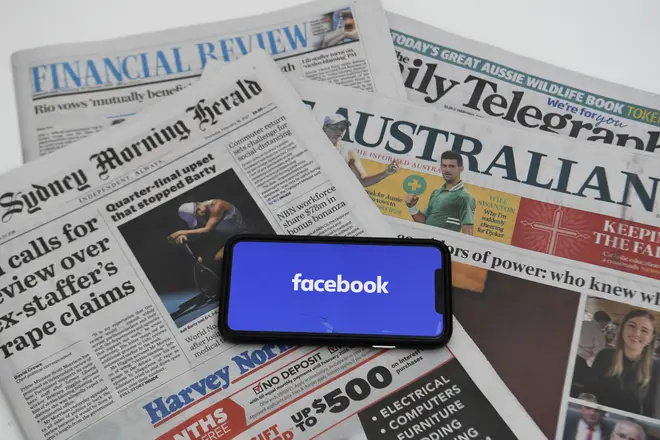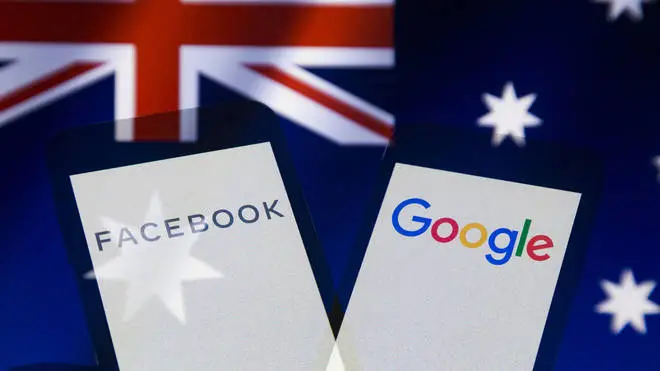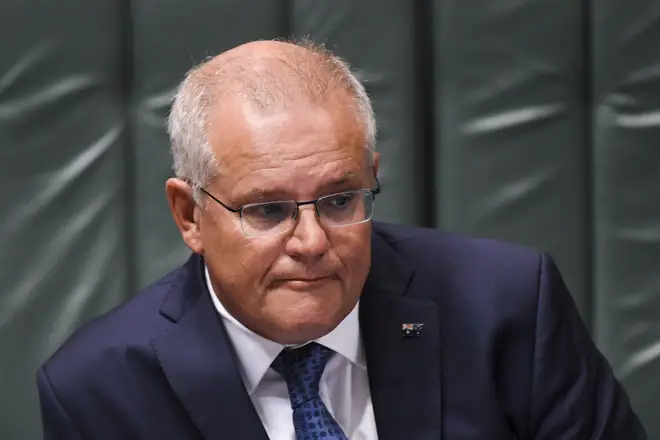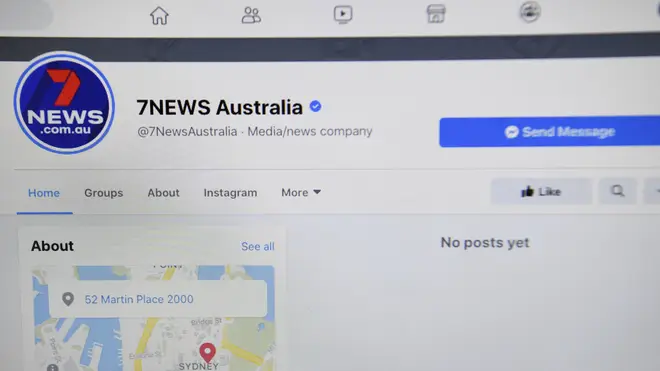
Nick Ferrari 7am - 10am
18 February 2021, 17:57 | Updated: 18 February 2021, 21:19

A major row between Facebook and Australia has led to the social media giant blocking news articles on its feed - so why is there a dispute? And could Facebook block news articles in the UK?
Facebook's decision to restrict Australian publishers and users from sharing articles on its platform came amid a row over who should benefit from advertising revenue generated by news content on its feed.
Both sides believe an injustice is being served by the other, with the big-tech firm accusing the Australian Government of misunderstanding the issue, and Prime Minister Scott Morrison saying he will not be "intimidated" by the social media company.
For two decades, global news outlets have complained that internet companies are getting rich at their expense, selling advertising linked to their reports without sharing revenue.
But now, Australia is joining France and other governments in pushing Google, Facebook and other Silicon Valley giants to pay in order to channel more money to an industry that is cutting coverage due to shrinking revenues.
So what is going on between Facebook and Australia? Why does it matter? And could Facebook block news articles in the UK?

Facebook announced on Wednesday that it will be restricting publishers and users in Australia from sharing news articles on its platform.
The move came after Canberra proposed a landmark law - that passed through the House of Representatives and is expected to sail through the Senate - which would make the platform pay Australian news organisations for using their content.
William Easton, managing director of Facebook Australia & New Zealand, said the law "fundamentally misunderstands the relationship between our platform and publishers who use it to share news content".
The decision means news articles shared by publishers outside of Australia will not be viewable within the country, while international users will also not be able to share or view Australian content.
Read more: Facebook blocks news in Australia in row over paying for content
Watch: Wandering wallaby hops around hospital in Australia

In light of the proposed law, Google has announced deals with Rupert Murdoch's News Corp and Seven West Media. However, no financial details of the arrangement have been released.
The Australian Broadcasting Corporation (ABC) is also currently in negotiations with the big-tech giant.
Google accounts for 53 per cent of Australian online advertising revenue and Facebook 23 per cent, according to treasurer Josh Frydenberg.
It had threatened to make its search engine unavailable in Australia in response to the legislation, which would create a panel to make pricing decisions on news stories.
Read more: Victoria enters lockdown to halt spread of Kent Covid strain
Read more: Perth completes full lockdown after single Covid case

Other governments are also pressuring Google, Facebook and other internet companies to pay news outlets and other publishers for their material.
In Europe, Google had to negotiate with French publishers after a court last year upheld an order saying such agreements were required by a 2019 European Union copyright directive.
France is the first government to enforce the rules, but the decision suggests big-tech firms will face similar requirements in other parts of the 27-nation trade bloc.
Also last year, Facebook announced it would pay US news organisations including The Wall Street Journal, The Washington Post and USA Today for headlines, although no financial details were released.
In Spain, Google shut down its news website after a 2014 law required it to pay publishers.

'I was on social media for 17 hours per day on average,'' says caller
Developments in Australia and Europe suggest the financial balance between multibillion-dollar internet companies and news organisations might be shifting.
Australia is responding to complaints big-tech firms should share advertising and other revenue connected to news reports, magazine articles and other content that appears on their websites or is shared by users.
Its government acted after its competition regulator tried and failed to negotiate a voluntary payment plan with Google.
The proposed law would create a panel to make binding decisions on the price of news reports to help give individual publishers more negotiating leverage with global internet companies.
Crass and deeply irresponsible from Facebook. This gives a lie to all their warm words in recent years over their willingness to be a good citizen.
— Julian Knight MP (@julianknight15) February 18, 2021
Australia is the canary in the coal mine now as far as social media legislation is concerned. https://t.co/gYH4wQyp5j
Google's agreement means a new revenue stream for news outfits, but whether that translates into more coverage for readers, viewers and listeners is unclear.
The union for Australian journalists is calling on media companies to make sure online revenue goes into news gathering.
"Any monies from these deals need to end up in the newsroom, not the boardroom," said Marcus Strom, president of the Media, Entertainment and Arts Alliance.
"We will be pressing the case for transparency on how these funds are spent."
In the meantime, access occasionally could suffer, with Facebook's move on Thursday initially blocking some Australian commercial and government communications pages.

Adventurous wallaby hops around hospital in Australia
News accessed by Facebook's UK users could be hit with similar bans to those seen in Australia if current relations between big-tech and publishers turn sour in the future, a social media expert has warned.
Matt Navarra, a social media consultant, said Britain faces "no immediate threat" of similar action because of the launch of Facebook News - an initiative where the big-tech firm has paid a number of UK media outlets and provided them with more advertising and subscription opportunities, according to Facebook.
Brokering such agreements with publishers means there is a "stable relationship" for now, but Mr Navarra warns that deals could crumble in the future if one side feels the scheme is no longer worthwhile, especially if other countries like Australia set an example.
He said: "You could argue that these deals will fall apart, that one of the parties... (could) feel, in terms of precedents set in other countries, that the relationship needs to change or the deal needs to change, which could inevitably lead to similar kinds of bans by Facebook if it wanted to dig its heels in the UK."
Mr Navarra added: "And, likewise, publishers fight back in terms of what they do using Facebook as a tool to distribute their content as well.
"So, arguably, we could see bans in the UK and similar kind of actions by Facebook. But I think in the short term we're watching and learning about what others are doing."